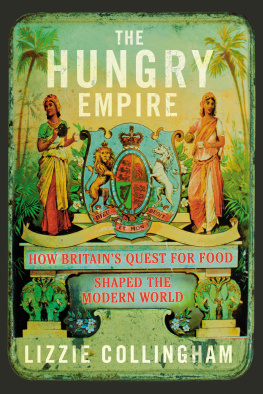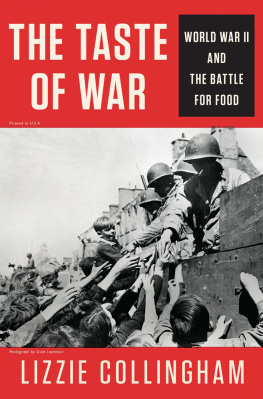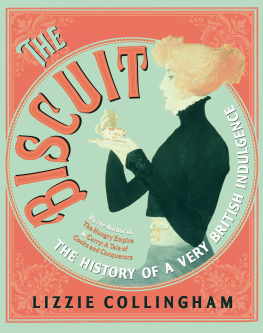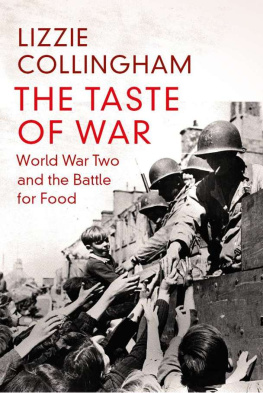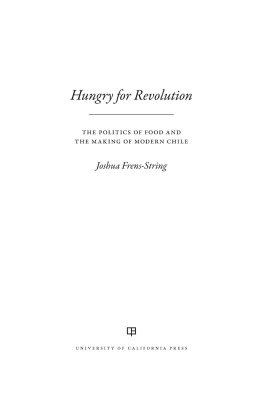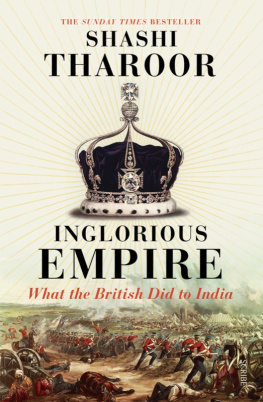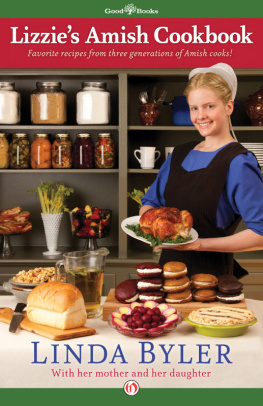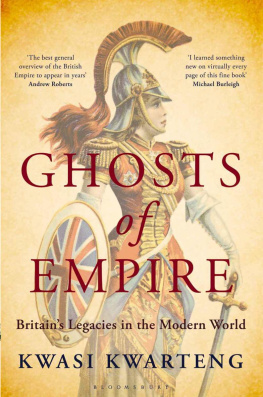lizzie Collingham - The Hungry Empire: How Britains Quest for Food Shaped the Modern World
Here you can read online lizzie Collingham - The Hungry Empire: How Britains Quest for Food Shaped the Modern World full text of the book (entire story) in english for free. Download pdf and epub, get meaning, cover and reviews about this ebook. publisher: Random House, genre: Home and family. Description of the work, (preface) as well as reviews are available. Best literature library LitArk.com created for fans of good reading and offers a wide selection of genres:
Romance novel
Science fiction
Adventure
Detective
Science
History
Home and family
Prose
Art
Politics
Computer
Non-fiction
Religion
Business
Children
Humor
Choose a favorite category and find really read worthwhile books. Enjoy immersion in the world of imagination, feel the emotions of the characters or learn something new for yourself, make an fascinating discovery.
- Book:The Hungry Empire: How Britains Quest for Food Shaped the Modern World
- Author:
- Publisher:Random House
- Genre:
- Rating:5 / 5
- Favourites:Add to favourites
- Your mark:
- 100
- 1
- 2
- 3
- 4
- 5
The Hungry Empire: How Britains Quest for Food Shaped the Modern World: summary, description and annotation
We offer to read an annotation, description, summary or preface (depends on what the author of the book "The Hungry Empire: How Britains Quest for Food Shaped the Modern World" wrote himself). If you haven't found the necessary information about the book — write in the comments, we will try to find it.
The Hungry Empire: How Britains Quest for Food Shaped the Modern World — read online for free the complete book (whole text) full work
Below is the text of the book, divided by pages. System saving the place of the last page read, allows you to conveniently read the book "The Hungry Empire: How Britains Quest for Food Shaped the Modern World" online for free, without having to search again every time where you left off. Put a bookmark, and you can go to the page where you finished reading at any time.
Font size:
Interval:
Bookmark:


The glamorous daughter of an African chief shares a pineapple with a slave trader Surveyors in British Columbia eat tinned Australian rabbit Diamond prospectors in Guyana prepare an iguana curry
In twenty meals The Hungry Empire tells the story of how the British created a global network of commerce and trade in foodstuffs that moved people and plants from one continent to another, re-shaping landscapes and culinary tastes.
To be British was to eat the world. The Empire allowed Britain to harness the globes edible resources from cod fish and salt beef to spices, tea and sugar. By the twentieth century the wheat to make the working mans loaf of bread was supplied by Canada and his Sunday leg of lamb had been fattened on New Zealands grasslands.
Lizzie Collingham takes us on a wide-ranging culinary journey, charting the rise of sugar to its dominant position in our diets and locating the origins of the food industry in the imperial trade in provisions. Her innovative approach brings a fresh perspective to the making of the Empire, uncovering its decisive role in the shaping of the modern diet and revealing how virtually every meal we eat still contains a taste of empire.
Lizzie Collingham taught History at Warwick University and was a Research Fellow at Jesus College, Cambridge before becoming an independent historian. Her books include Curry: A Tale of Cooks and Conquerors and The Taste of War: World War II and the Battle for Food. She is currently an Associate Fellow of Warwick University and the Royal Literary Fund Fellow at Newnham College, Cambridge. She recently completed a project researching the history of the kitchens of the Indian Presidents palace and regularly lectures on a gastronomic tour of Kerala. She works in a garden shed near Cambridge.
.
.
.
.
.
.
.
.
.
.
.
.
.
.
.
.
.
.
.
.
.
.
.
.
.
For Partha Mitter and in memory of Chris Bayly

Bring food! shouted the small boy who had taken on the role of the white district officer.
In a village in north-eastern Rhodesia, a group of Bemba boys were playing at being Europeans one of their very favourite games. The main actor was lounging in a tangle of branches and bark rope, which stood in for a chair. During the course of the game he repeatedly called out for food until one of his playmates who was acting as a servant objected.
You cant ask for food again, he whispered, aghast. Weve only just brought it to you.
You know nothing about Europeans! his master immediately replied. That is just what they do all day just sit and call, Boy! Bring me food.
The Bemba, who ate only one meal at the end of the day, regarded as childish the European habit of constantly breaking off from an activity to take tea or some other refreshment. This scene, witnessed by Audrey Richards, an anthropologist who lived among the Bemba for several years in the early 1930s, stands as a metaphor for the relationship of Britain to its empire. Bring me food became a persistent demand.
This book tells the story of how Britains quest for foodstuffs gave rise to the British Empire. Each chapter opens with a particular meal and then explores the history that made it possible. Why were a Frenchman and a glamorous Afro-Portuguese woman sharing a pineapple in West Africa in 1698? How did a team of surveyors prospecting for copper in British Columbia in 1901 come to be eating Australian rabbit? What configuration of circumstances led a group of Afro-Guyanese diamond miners to be cooking an iguana curry in 1993? Every chapter tells an individual story, but they all link up in a narrative that reveals food as a driving force of empire.
From the sixteenth century, when the British started to venture out across the oceans, they went in search of food. West Country fishermen began bringing cargoes of salt cod back from Newfoundland in the 1570s, and in the next century East India Company carracks unloaded millions of pounds of pepper and spices at Londons East India docks. Before then, food imports had catered for the wealthy, who drank Burgundy wines with their heavily spiced meals and poured Italian olive oil on their salad greens. In the sixteenth century, the dried figs and currants, citrus fruits, almonds and spices that English merchants acquired in Antwerp in exchange for woollens accounted for only a tenth of all Englands imports. But over the following centuries foodstuffs went from playing a negligible role in Englands trade to centre stage. By 1775, half (by value) of all the goods Britain imported were foodstuffs, and West Indian sugar had ousted linen from first place as the most valuable of all the countrys imports. In fact, with a value of over 2.3 million, West Indian sugar was worth more than all the manufactured goods arriving on Britains shores.
By now, food imports were no longer just for the rich. In fact colonial groceries had been thoroughly integrated into the diet of the entire population. Caribbean rum was the favourite Irish tipple, and everyone from street sweepers to gentlewomen enjoyed an afternoon cup of China tea sweetened with West Indian sugar. Britain sat at the centre of an impressive trading empire, and foodstuffs helped to turn the wheels of commerce. The Atlantic slave trade relied on supplies of maize and manioc grown in West Africa; the slaves working on South Carolinas plantations grew rice that the British traded with northern Europe for the timber and pitch needed by the shipbuilding industry. Trade and sea power were mutually dependent. The merchant marine was an invaluable source of experienced seamen in time of war, and the Royal Navy protected the trade routes. The tax revenue generated by the import of commodities from around the globe in turn financed the building of warships.
The empire that grew out of this trade is often referred to as Britains First Empire. It encompassed a wide variety of types of settlement from fishing enterprises on Newfoundlands shores and agro-industrial sugar plantations on West Indian islands to neat English farms in southern Ireland and forts manned by a handful of soldiers dotted along the West African coastline. The Atlantic trade dominated, although the East India Company, with its factories in India and China, was growing in power and importance. What brought these disparate entities together in a common framework under the umbrella of Britains empire was not the manner in which they were governed but how trade with them was regulated. The Navigation Acts stipulated that only British ships could carry their goods. For most of the eighteenth century the term empire did not denote the possession of territory but the power to dominate trade. The first British Empire was an empire of the seas.
Britains Second Empire emerged in the nineteenth century after the loss in 1783 of the thirteen mainland American colonies. This dealt the Empire a blow but in 1815 Britain emerged triumphant from the Revolutionary and Napoleonic wars with France as the worlds pre-eminent maritime power. British territories expanded into India, Africa and even as far afield as Australasia, and a mixture of military force and financial investment ensured that Britains economic hegemony extended the nations power into China and South America. Even the United States was reintegrated into this informal empire until the 1870s, when its own process of industrialisation allowed it to pull away from the British sphere of influence. This restless expansion allowed Britain to harness the worlds resources.
Font size:
Interval:
Bookmark:
Similar books «The Hungry Empire: How Britains Quest for Food Shaped the Modern World»
Look at similar books to The Hungry Empire: How Britains Quest for Food Shaped the Modern World. We have selected literature similar in name and meaning in the hope of providing readers with more options to find new, interesting, not yet read works.
Discussion, reviews of the book The Hungry Empire: How Britains Quest for Food Shaped the Modern World and just readers' own opinions. Leave your comments, write what you think about the work, its meaning or the main characters. Specify what exactly you liked and what you didn't like, and why you think so.

